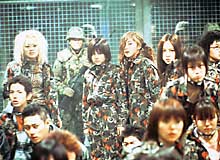"Battle Royale," Kinji Fukasaku's last completed film, created what is a rarity in the Japanese movie business: a scandal. Based on a best-selling novel, this film about 42 school kids forced to play a murder game by a repressive government made guardians of public morals see red, even before its December 2000 release. Diet members and the minister of education publicly voiced alarm, while Eiren -- the film industry's censorship body -- slapped an R-15 rating on the film, which meant that kids the same age as its 15-year-old protagonists were banned from seeing it.

The problem was less the film's violence per se (it didn't show much that hadn't been shown before, from Hollywood and elsewhere) than the tender age of its victims and the massiveness of the slaughter. The film was not total exploitation (in between shots of heads exploding, the characters bonded, fell in love and otherwise showed up the inhumanity of the regime) but Fukasaku was obviously out to shock, and shock he did. Naturally, once the authorities decried the film's effect on impressionable young minds, the young flocked to see it. "Battle Royale" ended up grossing 3.1 billion yen, the most of any live-action Japanese film that year.
















With your current subscription plan you can comment on stories. However, before writing your first comment, please create a display name in the Profile section of your subscriber account page.